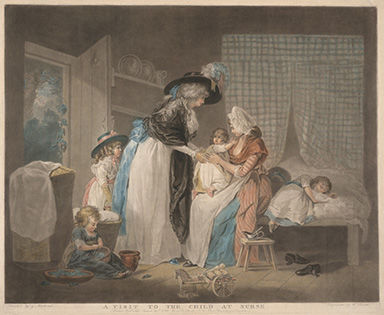BECC Research Fellows' Seminar
- Location
- Danford Room - 224 on second floor of the Arts Building
- Dates
- Wednesday 19 April 2023 (16:00-18:00)

Birmingham Eighteenth Century Centre (BECC)
This special double-bill seminar features two recent recipients of the BECC-BSECS Research Fellowship Award, Kate Gibson (Manchester) and Alice Rhodes (York), who will each share findings from their research in the Cadbury Library's eighteenth century manuscript archives.
Kate Gibson (University of Manchester)
‘I have been so long accustomed to think of you as my Child’: Histories of Care in Birmingham’s Special Collections
The vast majority of research on the history of fostering and adoption in Britain has focused on the nineteenth and twentieth centuries, when charitable and state provision expanded dramatically. However, these practices evolved out of decades of informal, interpersonal fostering and adoption as ways of caring for children who needed additional parental support. Using the correspondence collections of the Ambler and Jerningham families kept in Birmingham’s Special Collections, this talk investigates the variety of circumstances that led to children being fostered, and the relationships that evolved between child and foster-parent. Examining fostering and adoption provides new perspectives on how family life in the past functioned, the affective and instrumental significance of relationships beyond blood and marriage, and the value of fostering as a form of care work.
Alice Rhodes (University of York)
Body and Soul: The Material Voices of Joseph Priestley and John Thelwall
Studies of speech, whether physiological, political, or poetic, saw increased attention and took on new significance in British literature in the politically turbulent period from the 1770s to the 1820s. This talk examines how two writers and orators, chemist and dissenting minister Joseph Priestly (1733-1804) and political activist turned speech therapist John Thelwall (1764-1834), drew on their various professional identities to formulate new understandings of the power of the voice. Influenced by politically and religiously controversial theories of materialist philosophy and physiology, Priestley and Thelwall each came to present utterance as a form of physical and effective action. And this idea of speech as embodied material action took on its own political resonances.
Image: William Ward, 1766–1826, British, A Visit to the Child at Nurse, 1788, Mezzotint on moderately thick, moderately textured, blued white, laid paper, Yale Center for British Art, Paul Mellon Collection, B1977.14.12019.